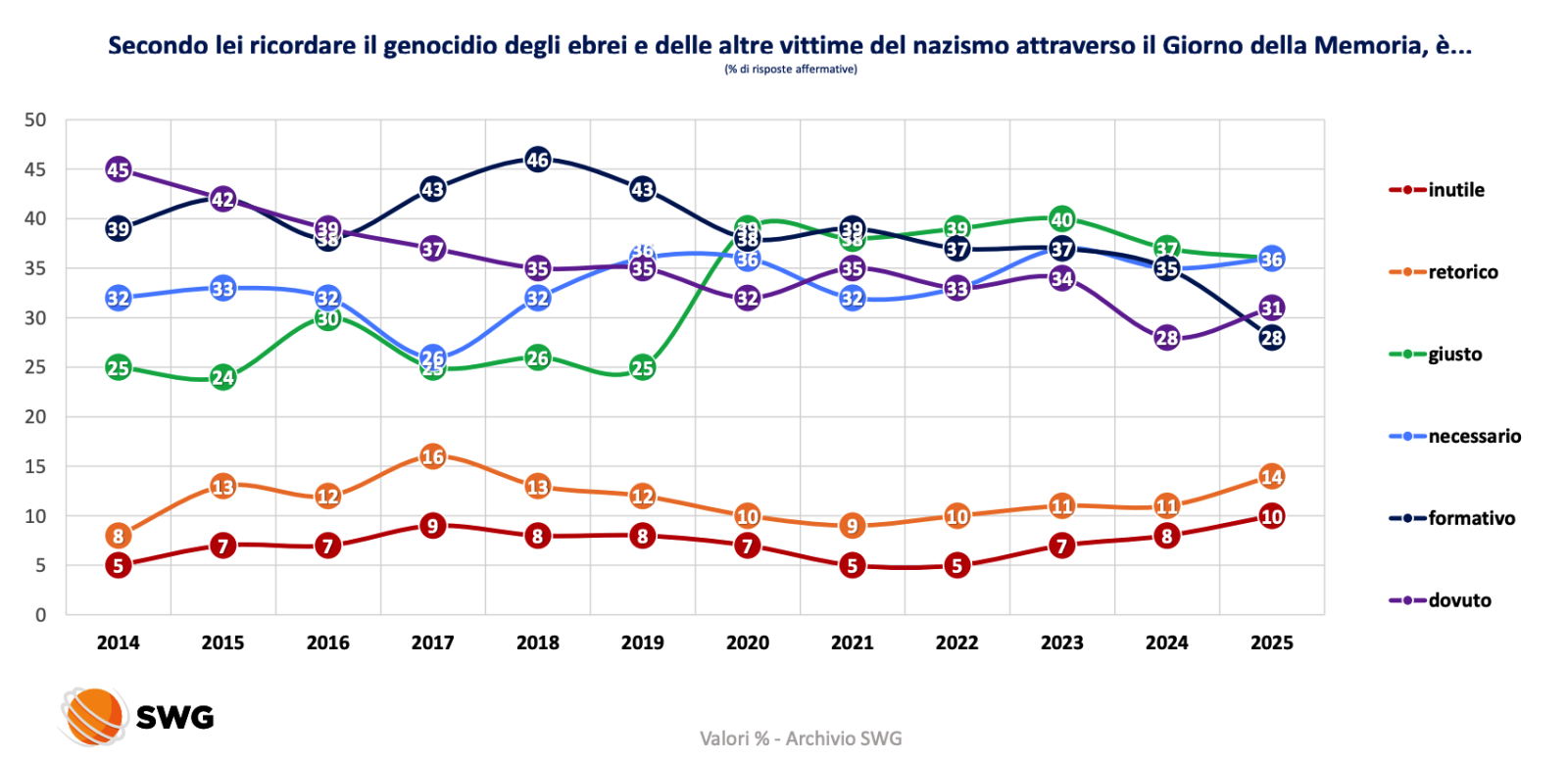SURVEY – SWG: Italians Detached from Holocaust Remembrance Day, ‘Necessary but Rhetorical’

“The most significant finding emerging from the survey Italians and Holocaust Remembrance Day: The evolution of perception from 2014 to 2025 appears to be related to declining attention. Paradoxically, at a time when attention to the Jewish world is at an all-time high and many issues have been exacerbated, Holocaust Remembrance Day seems to be becoming less and less relevant. And that was not a given.”
This is the first comment by sociologist Riccardo Grassi, who since 2012 has led SWG, a social research institute that has been monitoring Italian society since 1997 and has published an annual survey on Italians’ perception of Holocaust Remembrance Day for the past decade. “The trend of declining interest and general awareness of Holocaust Remembrance Day had already started in 2023. The signs were there: this is not the first significant decline, but we are now in the fourth consecutive year of declining attention. In the past, this drop decrease could have been linked to the fact that Judaism was rarely discussed except on January 27. Now, however, so much has been said and written—especially about anti-Semitism —yet it seems to have had no direct impact. The two things seem disconnected.”
Despite the context in which the 2025 survey was conducted—marked by the strong emotional impact of the Middle East situation on public opinion and the rise in both anti-Israel and pro-Palestinian sentiment—only a minority of respondents have developed a more negative view of the Jewish people. In contrast, 15% say they feel closer to them.
Most Italians acknowledge that the conflict has led and will lead to a rise in anti-Semitism, making it increasingly necessary to protect Jewish communities. However, this has had virtually no effect on participation in or recognition of Holocaust Remembrance Day.
The perception that anti-Semitism is widespread in Italy has risen by 15 percentage points. Yet, this perception is not strongly linked to one’s stance on the Israel-Hamas conflict and is shared across all political affiliations. Meanwhile, the percentage of Italians who know what January 27 commemorates has remained stable over time. But even those who now feel closer to the Jewish people following recent events show a significant decline in participation in Holocaust Remembrance Day commemorations, raising concerns that the perceived value of the occasion may be weakening.
There has also been a sharp drop in the belief that the anniversary has educational value, falling from 46% in 2018 to 28% today—the lowest level in the past decade—while negative assessments have increased.
“Another striking point is that even among those who feel closer to the Jewish people after October 7, engagement with Holocaust Remembrance Day has declined,” continued Grassi. “In a way, it’s as if the present is swallowing the past, and the risk is that this will have long-term effects. Keeping Memory alive is already difficult in a context where firsthand witnesses are disappearing, and in the coming years, it could become truly challenging.”
Grassi also noted that the decline in participation is not due to a lack of knowledge. Instead, fewer people feel personally involved, and there is a growing sense of detachment from the event itself.
“We must also consider how Italians struggle with anything perceived as institutional, formal, or mandatory,” Grassi added. “These are occasions where ‘illusions of participation’ can arise because organized and vocal groups take the lead, which, in practice, discourages spontaneous engagement. We’ve observed this across multiple issues—anything that feels imposed tends to generate resistance. But this is not about disaffection with Judaism.”
“The share of those with a negative opinion of the Jewish people has risen by 8%, but this does not overlap with the group that had high levels of engagement with Holocaust Remembrance Day. The declining interest has more to do with fatigue surrounding commemorations and the perception of excessive politicization.”
Holocaust Remembrance Day, the survey concludes, is increasingly seen as “becoming more rhetorical and pointless—but still right, necessary, and deserved.”
